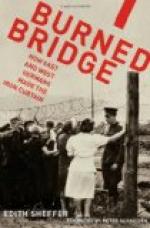“Man, but the heat makes ye crabbed,” MacDonald returned with naive candor. “Yon’s a meenister.”
“Bagosh, yes,” Breyette chuckled. “Dat ees de man of God w’at you see. He’s com’ for save soul hon’ de Eenjun hon’ Lone Moose. Bagosh, we’re have som’ fon weet heem dees treep.”
“He’s a loon,” MacDonald paused with a forefinger in the bowl of his pipe. “He doesna know a moccasin from a snowshoe, scarce. I’d like tae be aboot when ‘tis forty below—an’ gettin’ colder. I’m thinkin’ he’d relish a taste o’ hell-fire then, for a change—eh, Mike?”
The two of them went off into a fit of silent laughter, for the abysmal ignorance of Wesley Thompson concerning practical things, his awkward length of body, his student’s pallor that the Athabasca sun had played such havoc with, his blue eyes that looked so often with trepidation or amazement on the commonplaces of their world, his general incapacity and blind belief that an all-wise Providence would personally intervene to make things go right when they went wrong, had not struck these two hardy children of the solitudes as other than a side-splitting joke.
“He rises i’ the mornin’,” MacDonald continued, “win’ a word frae the Book aboot the Lord providin’, an’ he’d starve if nabody was by t’ cook his meal. He canna build a fire wi’oot scorchin’ his fingers. He lays hold o’ a paddle like a three months’ babby. He bids ye pit yer trust i’ the Lord, an’ himself rises up wi’ a start every time a wolf raises the long howl at nicht. I didna believe there was ever sae helpless a creature. An’ for a’ that he’s the laddie that’s here tae show the heathen—thae puir, sinfu’ heathen, mind ye—how tae find grace. No that he’s any doot aboot bein’ equal tae the job. For a’ that he’s nigh helpless i’ the woods he was forever ying-yangin’ at me an’ Mike for what he ca’s sinfu’ pride in oor ain’ persons. I’ve a notion that if yon had a bit o’ that same sinfu’ pride he’d be the better able tae make his way.”
Old MacPhee took the blackened clay pipe from his mouth and puffed a blue spiral into the dead, sultry air. A sour expression gathered about his withered lips.
“Dinna gibe at yon puir mortal,” he rebuked. “Ye canna keep fools frae wanderin’. I’ve seen manny’s the man like him. It’s likely that once he’s had a fair taste o’ the North he’ll be less a saint an’ more a man.”
The afternoon was far spent when they landed. Breyette and MacDonald made themselves comfortable with their backs against the wall. Supper came and was eaten. Evening closed in. The bold, scorching stare of the sun faded. Little cooling breezes fluttered along the lake shore, banishing the last trace of that brassy heat. Men who had lounged indoors, or against shaded walls roamed about, and half-breed women chattered in voluble gutturals back and forth between the cabins.




